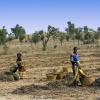
The National Member Organization (NMO) for Germany is the German Association for the Advancement of IIASA. Germany’s Federal Ministry of Education and Research (BMBF) funds the NMO and the IIASA annual membership fee.
Founding membership since 1972 as Max Planck Society for the Advancement of Sciences, Federal Republic of Germany (1972-1983), Academy of Sciences of the German Democratic Republic (1972 to 1990), and German Association for the Advancement of IIASA (1984 to present but affiliate member 1998 to 2002).
 © IIASA
© IIASA
IIASA Connect
Are you a member of our German regional community? IIASA Connect is our exclusive platform bringing this network together. Join today!
News

14 February 2025
Strengthening citizen science and sustainability monitoring in Europe

05 February 2025
German Ambassador visits IIASA to strengthen collaboration

22 January 2025
Winners of the 2024 Young Scientists Summer Program Awards Announced
Events
Humboldt University of Berlin
IIASA at Fragile Lives 2024: Evidence for human development, food security, and peace in poly-crises
Potsdam Institute for Climate Impact Research (PIK) & Online
German IIASA Networking Event: "Systems analysis for a sustainable and peaceful future"
Focus

04 September 2024
The role of urban green spaces as nature-based solutions in Korea and Germany
Imagine a city where every neighborhood has lush green spaces that not only beautify the area but also improve the quality of life for its residents. How can we work together to make this vision a reality? Jaewon Son, a participant in the 2024 IIASA Young Scientists Summer Program shares insights into this important question.
27 June 2024
Strengthening the case for nature‑based solutions

Projects
Publications
Rasche, L., Schneider, U., & Steinhauser, J. (2024). FABLE Scenathon 2023 Pathways for food and land- use systems in Germany. Sustainable Development Solutions Network (SDSN) , Paris. 10.5281/zenodo.11547130. Minetto Gellert Paris, J., Escobar Lanzuela, N. , Falkenberg, T., Gupta, S., Heinzel, C., Verly Junior, E., Jolliet, O., Borgemeister, C., & Nöthlings, U. (2024). Optimised diets for achieving One Health: A pilot study in the Rhine-Ruhr Metropolis in Germany. Environmental Impact Assessment Review 106 e107529. 10.1016/j.eiar.2024.107529. Heisig, J., Milenkovic, M., & Pebesma, E. (2024). High-Resolution Canopy Fuel Maps Based on GEDI: A Foundation for Wildfire Modeling in Germany V.5. 10.5281/zenodo.8285855. Rasche, L., Steinhauser, J. , & Schneider, U. (2024). 2024 Germany FABLE calculator UP46 v1. 10.5281/zenodo.14506229. Birkmann, J., Schüttrumpf, H., Handmer, J., Thieken, A., Kuhlicke, C., Truedinger, A., Sauter, H., Klopries, E.-M., Greiving, S., Jamshed, A., Merz, B., Solecki, W., & Kirschbauer, L. (2023). Strengthening resilience in reconstruction after extreme events – Insights from flood affected communities in Germany. International Journal of Disaster Risk Reduction 96 e103965. 10.1016/j.ijdrr.2023.103965. Heisig, J., Milenkovic, M., & Pebesma, E. (2023). Five High-Resolution Canopy Fuel Maps Based on GEDI: A Basis for Wildfire Modeling in Germany. 10.5281/zenodo.8285855.



